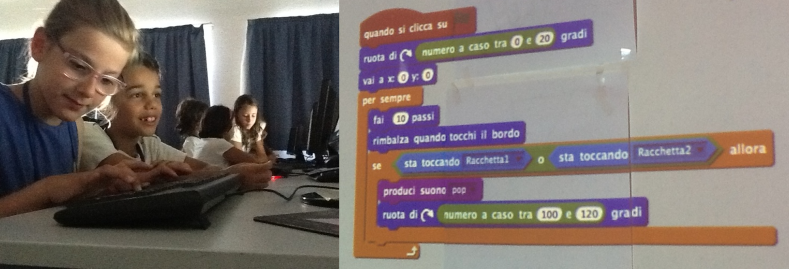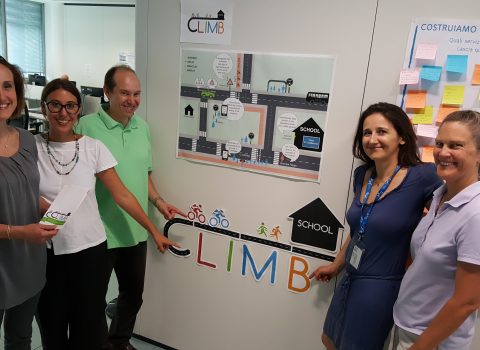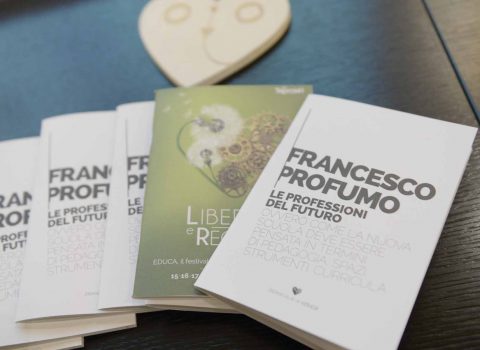WITH ROBO-summer PLAYING IS LEARNING
First edition of the educational robotics lab to bring Elementary School Children to STEM disciplines (Physics, Mathematics, Engineering and Computer Science)
From Tuesday 18 to Friday 28 July 2017, the first edition of ROBO-estate was held in Cadine (TN) at the Trento 6 School Division, a program that aims to:
- help involved children in developing critical thinking about gender stereotypes that the social system they live in (family, school, TV and other media) conveys;
- make all the participants, especially the girls but not only, more aware of their skills and potential in STEM subjects by infusing in them courage, determination, and confidence in successfully engaging in technical and scientific jobs and careers.

Through videos, movies and robotics activities presented as games, the children gradually discover the various fields of robotics in every aspect of our daily lives, discussing a number of questions about the impact of technology on society.
The ROBO-summer project was promoted by the school, already engaged in similar activities, taking into account the multi-year experience of the namesake laboratory proposed as a summer activity for the kids of FBK’s employees.
The activities of educational robotics, organized with researchers by FBK, combined with meetings with women engaged in technical professions (models of inspiration especially for the girls attending the activities) and visits to robotized companies, are the experiences to gradually draw children to science and technology in a multidisciplinary and engaging way.
The importance of all these activities is related to the fact that girls could hardly imagine professional opportunities they do not have experience of, so they could not aspire to become something they do not even know. In fact, our preferences are shaped by what we read, by what we learn in school and above all, more directly, by what we see around us.
Educational Robotics is a fun and enjoyable activity that acts on soft skills such as creative thinking, problem solving, communication, teamwork and decision making.
Other non-cognitive skills that are fostered are patience and discipline, no less important skills of the intellectual quotient.
The activities offered during the camp have had a common theme: the smart city. This common theme increases individual motivation and collaboration between groups stimulating fantasy and creativity. The main activity of the camp is the design, construction and programming of some robots, using different materials: recycled materials (creative robotics), Lego Wedo 2.0 kit and Lego Mindstorm NXT kit. The proposed program is curated by researchers from FBK with the support of Cooperativa Kaleidoscope, the collaboration of high school students engaged in apprenticeship programs. 25 students from third, fourth and fifth grade of the Elementary School of the Trento 6 School Division participated.
The program is divided into two weeks: in the first week, the children got to know each other and through different group work they learned the first elements of programming needed to start building robots.
It all starts with an introduction to robotics through a video and the exploration of the kits and an introduction to sensoristics and mechanics with Lego Wedo. After visiting FBK to meet its researchers, and Unifarm to see irs automated warehouse, the children learned how to program simple games thanks to the use of Scratch, the intuitive “children-friendly” software developed by MIT-EDU.

During the second week, concepts learned were applied to construction and programming aimed at a tangible scenario… with more in-depth programming and viewing documentaries on robotics followed by discussion. Finally, the fruit of all this in-depth and detailed work, made of many basic bricks, merges into the Lego NXT Robot Building and is returned with a final demonstration.
It is important to point out the work methodologies adopted, the result of consolidated practices:
- Learning by making: Educational Robotics is one of the most comprehensive and versatile tools to create experimental environments similar to those of real research: the children will be working in small groups (from 2 to 4) to give them the chance to try first-hand to create prototypes and face increasingly challenging goals.
- Role Models to let girls (but not only) be inspired by STEM by working on gender stereotypes that imply women’s lack of attitudes toward these disciplines
- New environments and new settings: visits at FBK and UNIFARM – to let girls and boys understand how the knowledge they have acquired in the summer camp can be used in real life.
- Self-organization and proactive attitude.
The products include:
- A final presentation of the various robots built and their operation addressed to parents and interested teachers;
- A personal report based on a diary of the activities performed in the camp by each child;
- A report on the results of the focus groups;
- A report on their experience by trainee students who followed the activities;
- An educational module based on educational robotics reproducible in other contexts.
Training course completed with the support of the Department for Equal Opportunities, under the notice “In summer we learn STEM – SUMMER CAMPS OF SCIENCE, MATHEMATICS, COMPUTER SCIENCE AND CODING”.



